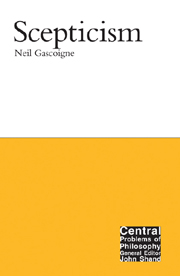5 - Un/natural doubts
Summary
Scepticism, intuition and the Humean Paradox
In common life we all have lots of beliefs, many of which are true and the majority of which amount to cases of knowing. I know that New York is east of Chicago, my car is parked in front of the house and that Karen is afraid to wear a hat. If asked why I think I know these things (by myself or another), I have a pretty clear idea how to respond: grab an atlas; point to the dilapidated Ford outside; explain the strange circumstances attending Karen's upbringing. Pushed for evidence beyond a certain point I'm likely to become either bemused or irritated (‘because that is what it means to be east of something’). Practical attitude doubts operate within a limited ambit of reason-giving, and do not bear on our entitlement to the concept of knowledge.
S1 From the engaged standpoint of common life we have an ability to reflect on our beliefs and ask if we are justified in believing/know them to be true (practical attitude doubt)
As we have we have seen, however, practical attitude doubt does not appear to exhaust the possibilities. For example, contemplating an empirical claim q, it seems quite natural to press the question of how we know that q is the case in a different sort of way. We now find ourselves making a general observation about the dependence of our empirical beliefs on experience.
- Type
- Chapter
- Information
- Scepticism , pp. 133 - 164Publisher: Acumen PublishingPrint publication year: 2002

